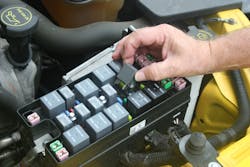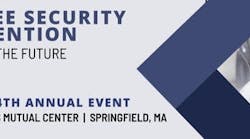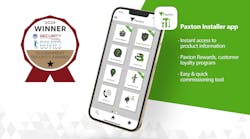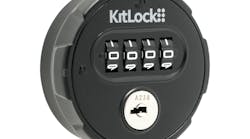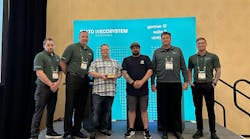Automotive locksmiths who seek a good resource for business and technical information have a new one in the International Association of Automotive Locksmiths (IAAL).
IAAL is a new division of ALOA. The division was founded after a vote by the ALOA board of executives in November 2021. The IAAL board consists of five members: one manufacturer representative, two ALOA ACE instructors and two so-called at-large members. The five members are: Jeff Baker of STRATTEC, Mannie Natal, Donnie Sherfield, Ed Woods and Travis Wright. The board will have split two- and three-year terms to start, with subsequent board members serving two-year terms.
Woods was named the first president of IAAL. He’s a longtime automotive locksmith and instructor, having started in the industry in 1992. He now is part of the team at Lockout Express in Dyer, Indiana.
Locksmith Ledger recently caught up with Woods to discuss IAAL and the goals for the organization for 2022 and beyond.
Locksmith Ledger: Congratulations on the new post. It seems like a big responsibility.
Ed Woods: At the ALOA convention [last year], I won the coveted “golden globe,” or whatever you want to call it — the lifetime achievement award. Most guys are on their way out when they get the lifetime achievement award. Me, I took on a whole new venture. I guess that makes me not real bright, but it’s something I’m dedicated to.
LL: How long do you plan to serve?
Woods: We just didn’t figure one year was going to be enough to get anything done this first go-round, so what we did was we made it two and three [years], and then after that, it would be two years.
Jeff Baker, myself and Donnie said we would take the three-year terms, and after that we’ll go up for election, but I will step down and be a trustee.
LL: How long has IAAL been in the works at ALOA?
Woods: Probably 10 years, but nobody took it seriously until about a year ago.
LL: Did anything in particular happen that made it click in for enough people to decide to do it now?
Woods: We missed a couple of ALOA conventions due to COVID. We missed one ALOA convention [in 2020] and were not sure we were going to get the second one in [in 2021]. But we did get it in.
At least 50% or more of the guys that are coming to the ALOA convention are coming just for the automotive classes. Over the past four or five years, every automotive class was full. There are 10 guys in the masterkeying class and six guys in the tubular-lock class, and we’re running over in the automotive classes.
We decided that we wanted to do something about expanding that, plus expanding the classes if you will and start our own little thing, sort of like the way SAVTA does it.
SAVTA has basic classes at the ALOA convention — safe servicing, safe combination, changing basic electronic safes. That’s about it. Then, we have the SAVTA convention [Safetech] where we drill safes; we do advanced manipulation, that kind of stuff. We’re wanting to do the same basic thing, only for cars with this new ALOA division.
LL: How long do you believe it will be before IAAL has a Safetech-type event on the schedule?
Woods: It’ll probably be next year [2023]. We’re hoping we can put it on late spring. Let SAVTA have the first [convention], then us and then ALOA.
We still want to support [the ALOA convention] as far as having classes, and probably this year, we’ll have more automotive classes at ALOA than we’ve had in a long time. At our show, we’re going to hopefully have classes on soldering, EEPROM, advanced programming of all kinds of vehicles and in a smaller venue where we can do more hands-on [instruction].
LL: What has the reaction been from ALOA membership and automotive locksmiths in general?
Woods: I have gotten some very positive feedback from manufacturers. I went to an event last October and talked about it in the hallways, and I got positive feedback from some very reputable high-end locksmiths who do 80% or more automotive, and they were like, “Run with it. We got your back.”
LL: Let’s talk a little about the state of automotive locksmithing. How much has electronics transformed the industry?
Woods: The automotive locksmith has to do more electronics than ever before — module programming — and the security is stored in multiple modules in the vehicle to where not just making keys but marrying the modules back together has become a locksmith job.
[Repair shops] change the ECM, electronic control module, on some vehicles, and now [the car] won’t start, because it has a VIN from a vehicle where [the shop] got it out of a junkyard. The instrument cluster won’t do anything, and you’ll get a message on your programmer, “VIN mismatch.” So, you have to go in and edit the VIN so the car says OK. Everything has to match up, so we’re doing more electronics that’s not just key generation, but also marrying modules back together.
More things are going to EEPROM [electrically erasable programmable read-only memory]. There are more motorcycles on the road today that are EEPROM than ever before. Part of that is due to Canada. Since 2006, Canada started putting transponders on everything, so the Can-Am motorcycle made in Canada, guess what? [It has a] transponder. The Vespa motorcycles coming from Europe? Transponder. And some of the Japanese bikes are even going to transponder. Even Harleys went to a transponder on their keys, and even if it stopped right now, what about all the ones that are out there on the road today?
LL: Given that, what are the biggest challenges for an automotive locksmith in 2022, increasingly complicated gateways?
Woods: A lot of it is the manufacturers putting in, not necessarily gateways, but things to make sure that they are the only ones that can [do the work]. Ford’s doing it. I believe their system’s called the FDRS. If you don’t have that, there’s certain Ford vehicles you can’t do. Toyota is doing the same thing. Toyota is making it harder for us. Even GM came out with new hoops to jump through.
But the machine manufacturers are slowly but surely hacking away at that and making it to where we can program them. Part of [what] slowed some of it down was COVID. Guys didn’t have vehicles to work on, but it’s starting to come back. We had engineers from Istanbul, Turkey, who were working on some of the new breakthroughs for programming, [who] couldn’t get visas to where they could even come into the country to test the software and the vehicles. A lot of the code-breaking, if you will, comes from overseas.
LL: Where do you see the industry five to 10 years from now?
Woods: I see the industry going more into electronics and more into EEPROM. I’ve seen more vehicles having to be EEPROMed, which involves taking the modules, literally the chips, off the boards, reading them and reinstalling them back and marrying it all together, or going in in some cases and capturing the key information off the chip that’s already in the car and cloning that to a new chip for the key. I think that’s going to become more commonplace than people like to admit.
LL: How much will that affect locksmiths and in what ways?
Woods: It’s interesting. When VATS [vehicle anti-theft systems] first came out, there was a bunch of locksmiths who went, “No, no, no. That’s electronics. I’m not going to do that,” and they jumped ship. Then the transponder came out, and they were like, “OK, well …” That lasted about two years, and then it became, “Oh, when you can’t onboard-program it anymore, you have to buy this really expensive machine to be able to program,” and hundreds of locksmiths bailed and said, “I don’t need a programmer for an LCN door closer. I’m going to put them on.” And more guys got away from the industry.
Now it seems, though, a lot of guys that got out of automotive locksmithing 10, 15 years ago are going, “Hey, those guys are making all the money. I want to be on their team.” Now it’s thousands and thousands of dollars in equipment, [but] they’re still coming back. They see that the automotive locksmith can go out and make a pretty decent living making car keys.
LL: What do you expect IAAL’s role will be in this?
Woods: Advancing education so we can train guys to be able to safely work on these cars. My main thing is educating people on as much as we can, so we can make these keys on a regular basis.
I personally am going to be reaching back to the old days as far as IAAL goes. I quit teaching a lot of the classes that I used to teach back in the ’90s, because people just weren't interested in the classes anymore, like steering-column teardown and impressioning and stuff like that.
But there are some people out there who are restoring these old [cars], especially the street rods and the hot rods, who want to have somebody work on their vehicle who’s a professional and isn’t watching a YouTube video. And the truth of the matter is I’m getting more calls for learning how to do that stuff, so I’m bringing some of the old classes back, while others are going to be teaching the newest, latest, greatest, state-of-the-art soldering and EEPROM.
When you have to take a 64-leg IC chip off a circuit board in order to read it, that’s not for the faint of heart. I watch with awe as some of these guys will unsolder a 64-leg chip that’s the size of a postage stamp off a board, solder five wires to it, read the information in it and turn around and make a key from that or two keys from the memory that’s in that chip and then solder it right back on there, put the car back together and stick the key in there and — voila! — this Mercedes is running again.
LL: So, IAAL classes will be a mix of old and new. What else do you foresee?
Woods: We’re going to let Brian’s group come hang out with us, because they like to see how we steal the cars. Brian [Vandenburgh, who is the CEO of Lockout Express] is president of the forensic locksmiths [IAIL]. So, the forensic automotive guys probably will have some classes at IAAL, just like they’ll have forensic safe classes at SAVTA.
I’ve already talked to a couple of the investigators who are forensic automotive locksmiths, and they’re already like, “Well, that’s probably a good place to put on a class for forensic automotive locksmithing.” And I was like, “Yes, and you’re more than welcome to come join us, and maybe we can share information.”
I’m just here to try to bring the right people together to make this happen for the good of the industry. I really don’t need anymore “golden globes.”
For more information about IAAL, go to: https://www.aloa.org/iaal/iaal-home.html
